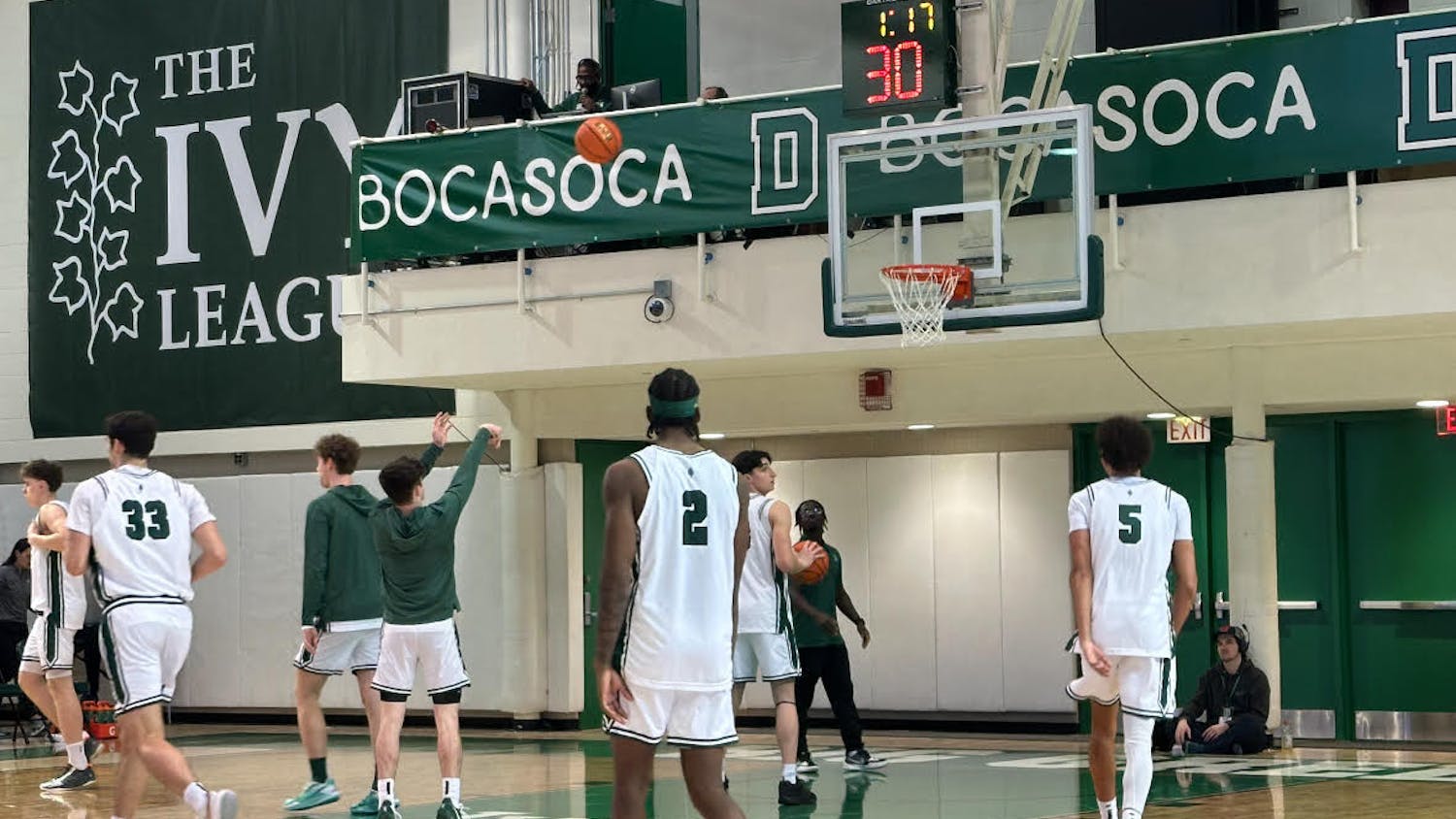On DartmouthSports.com, advertisements for Muscle Milk the "ready to drink functional beverage" have become seemingly omnipresent. The product's presence on the site, which began just this year, is a result of Muscle Milk's recent corporate sponsorship of Dartmouth athletics.
According to interim Athletic Director Bob Ceplikas, Big Green teams get roughly 50 percent of their funding from the College, but the other half must come from other sources.
That's where sponsors like Muscle Milk come in.
Most of the College's sponsorship deals involve cash exchange, said Sam Hopkins, the associate athletic director for marketing and promotions at Dartmouth, though some adhere to a product exchange model.
Muscle Milk's deal with the College, for example, provides free product for teams in turn for exposure from the College.
Dartmouth athletics has a similar agreement with White River Toyota, which allows the athletic department to use cars in return for Dartmouth advertising for the dealership.
Hopkins said the Muscle Milk deal is as valuable as cash to the Big Green, as the company is replacing supplements that teams would otherwise have to purchase.
Still, despite the several hundred thousands of dollars that corporate sponsorships bring to the athletic department each year, the department does not turn a profit off the deals, Ceplikas said.
"The revenue for sports teams does not exceed costs, and no sports team makes a net profit," Ceplikas said. "Our goal is to reduce costs anywhere we can."
Muscle Milk is one of Dartmouth's larger sponsors in terms of national prominence. Although the athletic department would prefer national sponsors, most of the agreements that Dartmouth engages in are with local or regional businesses, Hopkins said.
The same is true for many of Dartmouth's peers. Cornell's associate athletic director for sales and marketing Jeff Hall, for example, said that the Big Red's exposure is similarly limited.
"We would like to have national sponsors, but we really only have regional and local affiliates," he said.
Sponsors, Ceplikas said, are looking for exposure, something that Dartmouth cannot provide to a national audience. The Big Green usually only has three nationally televised games a year, he said.
Dartmouth recently lost the sponsorship of Unicel. The cell phone service provider was originally regionally oriented in the New England area and, in exchange for exposure, provided cell phone service to Dartmouth officials.
When Unicel was acquired by Verizon, a nationally focused brand, last year, Verizon ended the agreement, Hopkins said.
"The sponsors are looking for exposure, and we can give that to local companies," Ceplikas said.
While it is common to see Nike logos on the football team's jerseys or to spot the crew team walking around in Patagonia shirts, these are not an indication of sponsorship situations, Ceplikas said.
Instead, these products are a result of large companies selling their products to Dartmouth at discounted prices.
"Equipment comes in the form of deep discounts," Ceplikas said. "Hockey equipment companies compete for our business."
The College's hockey program, in fact, generally attracts the most sponsorship opportunities to the athletic department.
Ledyard National Bank, one of Dartmouth athletics' largest corporate sponsors, funds an annual hockey tournament, the Ledyard Bank Classic. In exchange for the money the bank provides to the athletic department, Ledyard receives naming rights of the tournament and signage at sporting events.
The Women's Holiday Basketball Tournament, for its part, is sponsored every year by the Blue Sky Restaurant Group, which owns Jesse's, Molly's and Lui Lui.
Jennifer Packard, director of public relations for Blue Sky, said that she believes the deal benefits both partners.
"It is joint marketing," she said. "Dartmouth gives out our information to visiting teams and fans about our restaurants, while we sponsor many Dartmouth activities."
Other Blue Sky-sponsored events include such programs as the Big Green Youth Fan Club. Blue Sky also provides much of the halftime entertainment during games. And, each year, Dartmouth gives a number of tickets to the Blue Sky Restaurant Group, which in turn gives about 90 percent of those tickets to local youth who would not be able to see a game otherwise, Packard said.
"Dartmouth athletics has reached out to the community, which meets Blue Sky's local message," Packard said.
While some sports certainly attract more business than others, the athletic department tries to have sponsors sign on for the entire year rather for just one team's season, Hopkins said, adding that this gives more business to all of Dartmouth's varied athletic teams.
"We try to sell packages," Hopkins said. "We want companies to be in front of fans year-round."
The Big Green, for example, has a "vending deal" relationship with Everything But Anchovies. Under the deal, EBAs is allowed to sell food at home games in exchange for considerations such as handing out Big Green athletic schedules with pizza deliveries.
EBAs owner Maureen Bogosian said that she is pleased with the current arrangement.
"The sponsorship fosters good relationships between EBAs and Dartmouth," she said.
The relationships that Dartmouth has fostered with local businesses like EBAs have helped the department through the recession, Hopkins said.
Although the department has seen significant sponsorship turnover, Ceplikas said, the department has worked to keep those it has.
"We try to make them aware of the opportunities we have here," he said. "The fact that sponsors renew is evidence that the relationships we have with them work."
Hopkins said the departments works hard to maintain relationships with its sponsors.
"We have not gone backwards in terms of sponsors because of hard work, relationships and cold calls by our department," Hopkins said.
The department may face future difficulties as the recession further takes its toll on the College, Ceplikas said. Dartmouth announced a target of $100 million in budget cuts over the next two fiscal years this weekend.
"As we face more budget challenges, we are looking to increase revenue any way we can," Ceplikas said.



